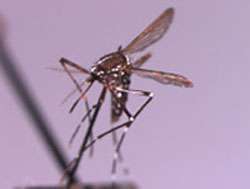West Nile virus: Be smart, don't panic

The current outbreak of West Nile virus may prove to be the worst since the disease was first recorded in New York 13 years ago, and it shows no indication of slowing down. As of the beginning of this month, the federal Centers for Disease Control and Prevention (CDC) had received more than 1,850 reports of West Nile virus cases across the country, and more than 40 deaths.
Rutgers Today: The New York Times reported on Aug. 27 that West Nile virus may ultimately turn up in every state, yet health officials say they have no concrete evidence as to why this year is worse than previous years. What are some working theories about why we're being hit so hard this time around? And is it time to panic?
Center for Vector Biology: First, there is never a need to panic, as this disease is very manageable given the proper tools, information and available mosquito control. Some years are worse than others, which might be explained by conditions such as drought (as experienced by the Midwest this year) that brings mosquito vectors (carriers) and bird carriers of the disease together, and/or changes in the virus itself.
Rutgers Today: Can you explain the trajectory the virus takes as it travels from infected bird to mosquito to human?
Center: A female mosquito may bite an affected bird in order to get a blood meal. The protein in the blood is used to develop eggs. If the bird was infected, the virus will end up in the mosquito's gut. The virus travels from the gut to the salivary glands of the mosquito. When a second blood meal is taken, the mosquito will inject some saliva when "biting," because the anticoagulants in the saliva make it easier to suck blood. The injection of saliva delivers the virus to whoever is supplying the blood, be it another bird, a horse or a human.
Rutgers Today: What are the symptoms, and how long after exposure are they likely to appear? Once a person has shown the first symptoms, how long does it take for the virus to run its course, and what long-term effects might it leave behind?
Center: It's estimated that about 80 percent of all people exposed to West Nile virus will not show any symptoms. Most of the rest develop what is termed West Nile fever, which is much like a summer cold: fever, headache, fatigue, and sometimes a rash, swollen glands and eye pain. It may be severe enough to send you to a doctor. About one in 150 will develop what is called West Nile neuroinvasive disease, which produces central nervous system symptoms such as paralysis and changes in mental status. The incubation period is about two to 14 days. For more severe forms of the disease, the amount of time it takes to run its course is variable, and can leave long-term effects. The mortality rate for those with the most severe form is between 3 and 15 percent.
Rutgers Today: In New Jersey, all 21 counties have mosquito-control programs of some sort, and your experts are playing a large role. Please tell us where you're focusing your efforts.
Center: At Rutgers, research is being done on developing an effective strategy for controlling one of the competent vectors of West Nile virus, the Asian tiger mosquito, or Aedes albopictus. Other research areas include examining the efficacy of various new pesticides and pesticide resistance, as well as basic research on the biology and ecology of the main mosquito vectors. We offer classes to mosquito-control personnel on how to identify mosquitoes by species, habitat and biology, aiding in their integrated pest management strategies, and we report on arbovirus levels and mosquito population trends during the mosquito season.
Rutgers Today: What steps can people take to minimize the risk of contracting the disease?
Center: There are several things people can do to reduce the risk of getting bitten. These are called the five Ds: Use Deet (read the instructions and see www.cdc.gov/ncidod/dvbid/westn … RepellentUpdates.htm); Dress with long sleeves and pants; avoid Dusk and Dawn, when mosquitoes are most active; and Drain water from around your house, including spots such as pots, gutters, bird baths and other containers.
Rutgers Today: What are the long-term public health implications of West Nile virus, and what measures is the federal government taking to contain future risks?
Center: West Nile virus is an excellent example of the global reach any organism can have on this planet. Because of the ease of travel and the growth of human population in new habitats, we can expect new diseases to make their presence known by emerging in potentially deadly ways. West Nile Virus should be interpreted as a wake-up call for the need to step up coordinated efforts to reduce introduction, establishment and expansion of new invasive vectors and diseases.















